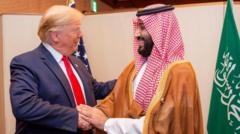President Trump embarks on an ambitious visit to Saudi Arabia, seeking to solidify business relations, sign over $1 trillion in agreements, and nurture diplomatic ties with Gulf states. His arrival highlights the contrast between his administration and Biden's previous engagements with the kingdom.
President Trump's Gulf Tour: Deals and Diplomatic Engagements in Saudi Arabia

President Trump's Gulf Tour: Deals and Diplomatic Engagements in Saudi Arabia
The Trump administration initiates a four-day tour in the Gulf, focusing on high-stakes agreements and forging stronger ties with Saudi Arabia, Qatar, and the UAE.
President Trump arrived in Riyadh, Saudi Arabia, on Tuesday morning for the first leg of a four-day Gulf tour that marks the beginning of his second term. Greeting him at the airport was Crown Prince Mohammed bin Salman, who rolled out a lavender carpet for the U.S. president at King Khalid International Airport. Trump's agenda centers on cultivating strong business relations with Saudi Arabia, Qatar, and the United Arab Emirates, aiming to ink agreements exceeding $1 trillion during the trip.
Upon landing, Trump was accompanied by high-profile figures including Secretary of State Marco Rubio and Defense Secretary Pete Hegseth. Their discussions commenced in a lavish setting adorned with marble columns, setting the tone for an exchange characterized by mutual respect—a sharp contrast to President Biden’s snub during his 2022 visit where he was met by a low-ranked official.
The trip emphasizes investment opportunities in sectors such as artificial intelligence and energy production, alongside the prospect of lucrative multibillion-dollar arms deals from U.S. manufacturers. The president is slated to address an investment forum later today, where key figures from major American corporations, including Citigroup and Nvidia, are expected to be in attendance.
In an interesting twist, Trump’s visit aligns closely with financial interests tied to his family. Reports confirm that his administration is on the verge of receiving a lavish Boeing 747-8 from Qatar's royal family—a potential record-breaking gift to the U.S. government.
While Trump focuses on international engagement, domestic issues loom large. House Republicans have introduced a series of draconian measures targeting the federal food stamp program, putting millions of low-income families at risk of losing access to this crucial assistance. With these proposals seeking to enforce stricter work requirements, opposition from Democrats and advocacy groups is growing, who argue that such actions would exacerbate poverty and hunger across the nation.
Meanwhile, as Trump navigates the Middle East’s geopolitical landscape, his approaches toward trade discussions, particularly in light of U.S.-China relations, remain in focus. Treasury officials highlighted the newly restructured agreement aimed at curbing escalations in tariffs—a strategic move as the president outlines his vision for economic growth through global partnerships.
As the Gulf tour progresses, all eyes will be on Trump's ability to balance his ambitious financial goals with the intricacies of international diplomacy, both at home and abroad.





















